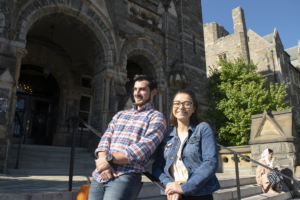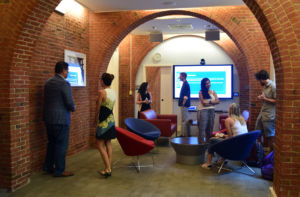
GUCR President Jake Lyons (COL ’20) left, and GUCD Chair Maria Cornell (SFS ’20), say their friendship allows them to discuss ideological differences.
Hailing from Brownsville, Texas, Gilbert Saldaña’s (COL ’19) political views transformed upon his arrival at Georgetown University, a diverse community compared to his hometown.
“I came from a very homogenous community where it was 90 percent Hispanic,” Saldaña said. “Before I came to college, personally I considered myself fiscally conservative and socially liberal. I tell people now I don’t think that can work. I don’t think those two things can work out.”
Forming friendships with people he did not encounter at home also changed Saldaña’s perspective on social issues.
“One thing that I did change my mind on was LGBTQ+ issues for sure, just because, it wasn’t a big thing where I came from,” Saldaña said. “One of my roommates was part of that community, and I learned a lot from him.”
Now a senior, Saldaña is still unsure about all the specifics of his political creed, but he remains open to learning about different perspectives. As president of the Georgetown Bipartisan Coalition, Saldaña is exposed to a range of opinions — libertarian, socialist, even apolitical — and aims to foster substantive conversations like those that changed his own mind.
This willingness to engage with diverse opinions characterizes most Georgetown students, according to Mo Elleithee (SFS ’94), director of the Georgetown Institute for Politics and Public Service. Elleithee noted the stark contrast between his job at Georgetown and his “side gig,” as one of the few Democratic contributors on Fox News.
“I come off the air and I look at my Twitter feed; it’s full of people saying, ‘I don’t know what Fox has you on; why don’t you go back to CNN or MSNBC where you belong,’” Elleithee said. “What gives me hope, and what I see differently here, and why we get so many political practitioners applying to be fellows in our program, is because I think the students here are more willing to listen, and they’re more willing to engage, and they’re less willing to feel comfortable isolated from one another.”
Partisanship has intensified as the United States approaches the midterm elections on Nov. 6. Members of each party see the other as more ideological and extreme than their own, according to a Pew Research report. Although often characterized as imperfect by students, political discourse at Georgetown still contrasts with national attitudes, perhaps because of the inherent connections within the university’s ideologically diverse student body.
Campus Political Diversity
Like Saldaña, Daniella Sanchez (COL ’22) and Monique Wilson (COL ’22) encountered new perspectives at Georgetown. The pair come from predictably blue regions — Southern California and New York City, respectively.
“Everyone is pretty much either Democrat or won’t talk about it,” Sanchez said.
Arriving at GU Politics’ pre-orientation program “Campaign Bootcamp,” which aims to give students a behind-the-scene view of campaigning, altered their views. Exposure to more political perspectives from her future classmates forced Sanchez to re-evaluate her beliefs.
“We were talking about racial injustice and at the same time the opioid crisis and how those two are intertwining. But then someone from Missouri actually said, ‘Well, the opioid crisis is a very big deal among white people as well; it’s not just a racial issue,’” Sanchez said. “That was really eye-opening, to see the different perspectives on the same issue.”
The U.S. opioid epidemic plays a significant role in the nation’s addiction crisis, which has led to a record 72,000 drug overdose deaths in 2017. Of those deaths, opioids were responsible for 49,000, according to AFP.
Before coming to Georgetown, Wilson’s main impressions of Republicans revolved around “the mess that’s going on with this administration.”
“I never had Republican friends. Then I came here,” Wilson said. “I just kind of assumed that Republicans are always very far right and I would never have anything in common with them.”
For many, personal relationships facilitate meaningful engagement with different perspectives.
Georgetown University College Democrats Chair Maria Cornell (SFS ’20) and Georgetown University College Republicans President Jake Lyons (COL ’20) describe themselves as good friends who frequently discuss their ideological differences. Despite the friendship, neither has converted the other. When Lyons suggested their conversation may have moderated Cornell, she laughed out a resolute “no.”
Cornell said growing up liberal ideas in conservative Idaho solidified her core beliefs; coming to Georgetown clarified her reasoning.
“I came in already with a very good understanding of conservative beliefs and why conservatives tend to believe what they believe,” Cornell said. “If anything, I’ve probably gone more left, but in a much more educated way. I’ve been able to gain more nuance in my beliefs and arguments.”
Lyons agreed, explaining how he and Cornell rely on each other’s perspective.
“I will see very pressing topical liberal issues or things that Democrats as a whole are typically going off on, and I’m not hearing the reasoned side of it,” Lyons said. “I’ll go to Maria and I’ll be like, ‘Give me some nuance; give me the actual reason behind this.’”
Limited Club Cooperation
Cornell’s and Lyon’s organizations have also embraced bipartisan cooperation: GUCD and GUCR have hosted several events together this year, including a homecoming barbeque, annual debates and a commemoration of Sept. 11 on Healy Lawn. They also work with GBC to host consensus-focused roundtables, most recently a conversation about the opioid epidemic Oct. 25.
Even if the roundtable has no clear resolution, finding common ground is productive, according to Lyons.
“Polarization feeds into the deterioration of civil discourse in our nation,” Lyons said. “By coming more to the middle, it would inherently improve civil discourse more because there would be more middle grounds on which to agree upon.”
GUCR Vice President Peter Hamilton (COL ’20) questioned the effectiveness of roundtables, which he characterized as full of qualifiers and fear of stepping on toes. Hamilton instead called for more debates.
“A great debate is going to inform you so much more about two different positions than a roundtable. A roundtable is built around building consensus,” Hamilton said. “But that’s not really going to give you an in-depth understanding of an issue.”
Hamilton expressed concern that private conversations and stereotypes undermine public efforts for productive dialogue, recounting public insults from upperclassmen and corrupted first impressions because of his conservative views.
Joseph Murgida (COL ’21), a centrist member of GBC, agreed Republicans are less likely to speak up. The fear of being wrong — among all students, not just conservatives — can allow for homogeneous discussions, according to Murgida.
“Because we are Georgetown students, we always want to be right, and thus avoid difficult conversations in which we can be proven wrong,” Murgida said. “That’s what’s created a culture of polarization. We talk to only the people we agree with because they’ll tell us we’re right.”
Understand, NOT Convert
Having a space for conversation and understanding others’ motivations is more important than changing minds, Cornell said.
“Personally, I don’t see people going to the extremes of each side as being the problem in our national discourse right now,” Cornell said. “It’s more how those fringes interact with each other, and the impact they have on communities.”
Elleithee argued the tone of the national discussion has distorted partisanship.

GU Politics is one of the several spaces, students with varying political perspectives can engage in discussion
“I don’t think changing one’s mind should always be the goal. I don’t hate partisanship. I think parties are important,” Elleithee said. “I think having two competing visions as to how to get to a shared world, a shared goal, is a healthy thing. The competition for ideas should make for better policy, should make for better government. The problem is the competition itself is no longer healthy.”
Founded under the McCourt School for Public Policy in 2015, GU Politics has a slogan that responds to such tension: “Public service is a good thing. Politics can be, too.” In one of their signature political discourse programs, GU Politics recruits five political practitioners as fellows each semester to host weekly discussions with students. Anyone can show up, and partisan fellows often attract attendees from the opposite side of the political spectrum, according to Elleithee. Elleithee referred to an example of a progressive student who never missed Grover Norquist’s discussion section.
Last semester, GU Politics expanded its political discourse initiatives with a pilot version of Dialogue and Dine, which has hosted meals for approximately 45 students in total. The dinner strives to facilitate conversation in an ideologically diverse setting. The program has plans to expand the number of dinners hosted, according to Student Coordinator Katie Rogers (MSB ’19).
“The reason we came up with Dialogue and Dine was because we felt while we had discussion groups and did try to foster that sense of discourse, we felt that there was an element missing,” Roger said.
Politics — Minus Parties
Not all political organizations are tethered to current events, and some distance from national partisanship can stimulate productive conversation, according to Georgetown’s main politically neutral clubs.
The Tocqueville Forum for Political Understanding, a political philosophy club, hosts a weekly Friday reading group. Its theory- and principle-based discussions foster understanding among attendees, who range from libertarians to staunch socialists, according to Tocqueville Forum President Micah Musser (COL ’19).
Issues-based political discourse can be counterproductive to fostering mutual understanding, Musser said.
“We generally talk about principles, not issues. I think a lot of political conversation is very issues-based. If abortion comes up, people are on one side or another, it’s a very issue-centered topic,” Musser said. “We talk about more abstract principles, which impacts how you think about issues, but it’s a way usually people have more ability to enter into a very understanding space.”
The Philodemic Society, Georgetown’s nonpartisan campus debating society, also operates its debates independently of the two-party framework; participants choose to speak in favor or against a given resolution. While not all topics are explicitly political — a Nov. 1 debate centered on the resolution “ignorance is bliss” — others address politically salient issues like gender-based quotas.
Choosing a broad range of debate topics, moving away from a competitive structure and building a community contributes to substantive discussion, according to Philodemic Society President Kathryn Li (COL ’19).
“You have to be able to find value in other people’s opinions if you’re going to come and have a good time,” Li said. “It’s a place where it’s encouraged to change your mind. There’s no party line; there’s no dogma that you need to show loyalty to.”
Navigating National Politics
On Nov. 6, GU Politics will host a Bipartisan Breakfast, several speaker events and an election watch party in conjunction with student groups like GBC, GUCD and GUCR. The celebratory events are a very visible sign of bipartisan cooperation that may not reflect the whole nation.
“Any college campus is oftentimes divorced to some extent from the real world,” Elleithee said.
However, he also expressed hope that Georgetown students will bring bipartisanship to their future leadership.
“This is true to your generation more broadly, that is, a much more collaborative and cooperative approach,” Elleithee said. “People are more willing to listen and engage and understand than my generation is.”



















